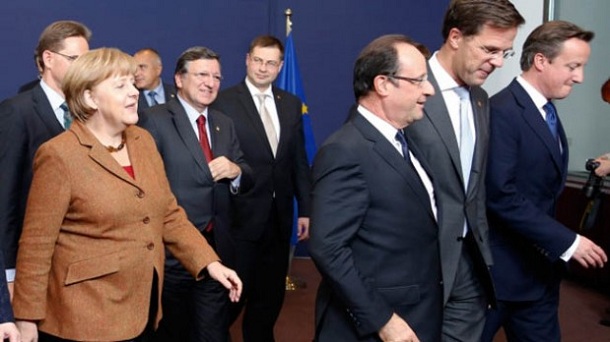EU leaders are to make another attempt to agree on a harshly reduced budget at the summit in Brussels. However, the EU parliament says it is ready to reject a deal that cuts spending on employment and growth.
“We feel pretty confident that we have the framework for a deal,” one EU official told reporters.
“The deal is not completely finalised, but we feel sure it will be done today.”
The proposal would set a limit of 960bn euros (£820bn) for projects the EU can promise to fund between 2014 and 2020.
But not all those projects will ever be completed, meaning the maximum amount it will ever pay out is 908.4bn euros (£774bn).
The current spending limit is 942.8bn euros (£803.4bn) so the actual spending cap looks like it will be reduced by 34.4bn euros (£29.3bn).
The breakthrough came at dawn – after 15 hours of intense negotiations between countries in the bloc.
Leaders, including UK Prime Minister David Cameron, will continue negotiating the draft document in the expectation that they can sign off on a final agreement before the weekend, officials said.
The deal is expected to strike a balance between the demands of northern European countries, such as Britain and the Netherlands that wanted a belt-tightening EU budget, and countries in the south and east that wanted sustained spending on farming subsidies and much-needed infrastructure.
According from Brussels, said: “This is the make or break meeting and leaders, including David Cameron, have been given a draft that lays out the budget.”
Mr Cameron is likely to claim victory if the actual spending cap is reduced to 908.4bn euros (£774bn). It would constitute the first budget cut in the EU’s 56-year history.
In the draft proposals cuts fall mainly on a new fund for cross-border transport, energy and telecoms projects, slashed by more than 11bn euros (£9.36bn), and on pay and perks for EU officials – a top target for Britain – reduced by around 1bn euros (£900m).
As well as the deal needing to be signed off by all EU leaders, it must be approved by the European Parliament, an obstacle that could prove difficult.
The European Parliament president has said he will not accept excessive cuts.
Ahead of the summit, France and Britain appeared at sharp odds over the headline numbers, with Denmark, the Netherlands and Sweden lining up on Britain’s side and Italy, Spain, Poland and others allied with France. Germany was left in the middle.
[adrotate banner=”54″]


